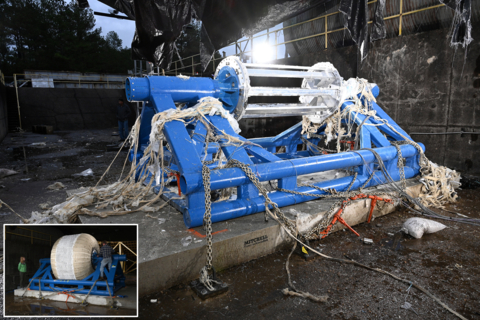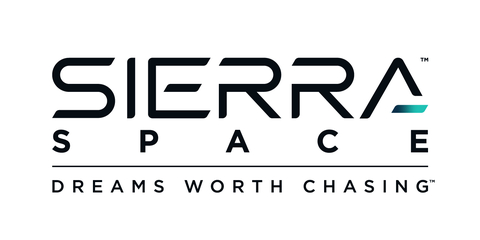Sierra Space Successfully Completes Series of Major Development Milestones for First Commercial Space Station
Sierra Space Successfully Completes Series of Major Development Milestones for First Commercial Space Station
Second Sub-Scale LIFE™ Habitat Test Article Exceeds NASA Certification Requirements After Ultimate Burst Pressure (UBP) Test
Sierra Space conducted a successful Ultimate Burst Pressure (UBP) test on a sub-scale version of the company’s LIFE™ habitat on November 15, 2022, at NASA’s Marshall Space Flight Center in Huntsville, Alabama. LIFE, or Large Integrated Flexible Environment, is an inflatable habitation module developed by Sierra Space for use on Orbital Reef, the world’s first commercial space station. A full-scale LIFE habitat expands to the size of a three-story apartment building in space, where astronauts can live and work comfortably for long periods of time. The test exceeded NASA certification requirements for inflatable habitation modules and further establishes Sierra Space as the leader in commercial space station development. Sierra Space is the only active commercial space company to meet multiple successful UBP trials. (Photo: Business Wire)
LOUISVILLE, Colo.--(BUSINESS WIRE)--Sierra Space, a leading commercial space company building the first end-to-end business and technology platform in space, announced today that the company’s LIFE™ habitat (Large Integrated Flexible Environment) has successfully completed its second sub-scale Ultimate Burst Pressure (UBP) test. Following the success of its first UBP test in July of this year, this second test further establishes Sierra Space as the leader in commercial space station development and the only active commercial space company to meet multiple successful UBP trials.
This latest test was performed on November 15 under NASA’s NextSTEP project for space habitation systems, which is managed by the agency’s Marshall Space Flight Center. NASA subject matter experts and ILC Dover collaborated with Sierra Space on the test, which occurred in a historic setting on Redstone Arsenal in Huntsville, Alabama. Due to the explosive nature of the test, the team placed the sub-scale space habitat in the flame trench of the Saturn 1/1B test stand, where NASA tested rockets for the Apollo program.
Sierra Space’s LIFE forms part of the company’s in-space destinations technology portfolio. The inflatable module, currently in development at NASA’s Kennedy Space Center in Florida, is a three-story commercial habitation and science platform designed for low-Earth orbit (LEO) that will allow humans to live and work comfortably in space. LIFE is constructed of high-strength “softgoods” materials, which are sewn and woven fabrics – primarily Vectran – that become rigid structures when pressurized.
Sierra Space is working towards NASA softgoods certification and is already exceeding programmatic requirements that demonstrate LIFE has followed a successful systematic and comprehensive design, fabrication and test program. The two sub-scale UBP tests in July and November achieved maximum burst pressure rates of 192 and 204 psi, respectively. Exceeding the safety requirement of 182.4 psi demonstrates that Sierra Space can meet the 4x safety factor required for softgoods inflatables within its current architecture at one-third scale.
“The LIFE habitat module is essential technology for enabling humans to safely and comfortably begin to develop new civilizations in space,” said Sierra Space CEO Tom Vice. “This project will service many different opportunities for the new space economy, and the results of this most recent test and milestone are testament to the progress our team is making to enable the next chapter in space commercialization. We look forward to continuing to build this key element in our technology portfolio and paving the way for the development of advanced inflatable habitat systems and architectures.”
This series of sub-scale tests is designed to support LIFE’s overall, full-scale development and future inflatable habitats, as Sierra Space builds the next generation of inflatable habitat architectures. These early “fleet” leader tests provide the design and analysis data to determine the safety and reliability of the inflatable architecture systems.
“Sierra Space is making incredible strides in the inflatable habitat technology development roadmap. In working with our partners ILC Dover and NASA, Sierra Space is quickly moving closer to softgoods certification,” added Shawn Buckley, LIFE Chief Engineer and Senior Director of Engineering at Sierra Space. “This second successful UBP test proves we can demonstrate design, manufacturing and assembly repeatability, all of which are keys areas for certification.”
Full-scale LIFE UBP tests will begin in 2023, in order to complete NASA’s certification of the habitat’s primary structure for human use in space. NASA’s NextSTEP program falls under the HQ Explorations Systems Development Mission Directorate (ESDMD) Technical Integration’s (TI) Pre-Formulation (PF) Habitation Team. For NextSTEP-2, Sierra Space is focused on performing critical risk reduction tests and assessing LIFE’s extensibility to multiple space destinations including the moon and Mars.
Among other missions in coming years, LIFE will serve as both a habitation and a payload element for the Orbital Reef commercial space station, a collaboration between Sierra Space and Blue Origin.
To view the Ultimate Burst Pressure Test on YouTube, visit: Sierra Space’s LIFE Habitat Successfully Completes Second Ultimate Burst Pressure Test
About Sierra Space
Sierra Space (www.sierraspace.com) is a leading commercial space company at the forefront of innovation and the commercialization of space in the Orbital Age, building platforms in space to benefit life on Earth. With more than 30 years and 500 missions of space flight heritage, the company is enabling the future of space transportation with Dream Chaser®, the world’s only winged commercial spaceplane. Under construction at its Colorado headquarters and expected to launch in 2023 on the first of a series of NASA missions to the International Space Station, Dream Chaser can safely carry cargo - and eventually crew - to on-orbit destinations, returning to land on compatible commercial airport runways worldwide. Sierra Space is also building an array of in-space destinations for low-Earth orbit (LEO) commercialization including the LIFE™ habitat (Large Integrated Flexible Environment) at the Kennedy Space Center in Florida, a three-story commercial habitation and science platform designed for LEO. Both Dream Chaser and LIFE are central components to Orbital Reef, a mixed-use business park in LEO being developed by principal partners Sierra Space and Blue Origin, which is expected to be operational by the end of the decade.
Contacts
MEDIA CONTACT:
Alex Walker
Sierra Space
(303) 803-2297
Alex.Walker@sncorp.com

